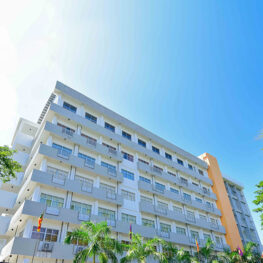Next intake in 2023
Introduction
Country studies have now received recognition as respectable inter-disciplinary areas of undergraduate and postgraduate study in many universities in the world. Sri Lankan universities have been so far slow to follow the trend of introducing American studies, Chinese studies, or Japanese studies as fully-fledged study programmes. The Faculty of Graduate Studies expects its Japanese studies programme to be a pioneering step in this direction, which will encourage the overall development of the field in other universities as well.
Japan is mainly known in the world today as an economic power – a partial perception which overlocks the country’s rich social and cultural heritage. There is little awareness of the interesting differences observable in Japanese societies even amongst the people of Asia. The new generation of policy makers in Japan see the value of promoting the study of Japanese society, culture, and history, as well as its economy, amongst Asians.
- To impart an in-depth knowledge about the historical development and current conditions of Japanese society, culture and the economy so that students may be able to identify important features of non-western civilizations;
- To develop language abilities for communication purposes and to develop an appreciation for basic Japanese literature in beginners;
- To impart an in-depth knowledge about Japanese businesses and management practices in order to enable students to facilitate business transactions in Japan;
- To improve the research capabilities of students who will read for postgraduate degrees in Japanese universities.
Semester I
PgD.JS 5101 – Japanese Language – level I
PgD.JS 5102 – History of Japan
PgD.JS 5103 – Economic Development of Japan
Semester II
PgD.JS 5204 – Japanese Language – level II
PgD.JS 5205 – Management Practices in Japan
PgD.JS 5206 – Society and Culture
PgD.JS 5207 – Independent Study
- The program leading to the PgDJS, unless otherwise decided by the Senate on the recommendation of the Faculty Board of the FGS for special reasons, as prescribed in the schedule shall be one academic year with five (05) courses of 20 total credit values, and an independent study component of 7000- 8000 words which carry 05 credits, offered in two semesters.
- The titles of courses, syllabi, course codes, credit values and other details are those set out in the Schedule and the Senate shall have power, on the recommendation of the Faculty Board of the FGS to amend, add to, delete from or vary the courses, their titles, syllabi, course codes, credit values and other details of the program. Such amendments shall come into effect after due notice.
- The Program of Study and Examinations leading to the PgDJS may be conducted in the conventional mode and/or through the information communication technology driven on-line mode or a combination of multi-modes and these By-Laws, and other relevant By-Laws, Rules and Regulations passed by the University of Colombo shall be so applied and interpreted in order to facilitate the effective conduct of the study program without compromising its integrity and quality.
- The medium of instruction and examination shall be English.
- The Senate, on the recommendation of the Faculty Board of the FGS shall appoint a Board of Examiners to conduct examinations and assess the performance of candidates.
By-law of PgDJS
- Duration: One year
- Weekend Programme
- SLQF level: 8
- Number of Credits: 25
- Medium of Instructions: English
- A Bachelor’s degree from a recognized University/ Institution in Japanese Studies; OR
- Any other Bachelor’s degree, with prior learning/ work experience in Japanese Studies; OR
- Postgraduate Diploma (SLQF 8) from a recognizes University/ Institution or an equal qualification acceptable to the Faculty Board of the FGS and the Senate of the University of Colombo with prior learning / work experience in Japanese Studies; OR
- Professional qualification in Japanese Studies from a recognized professional body acceptable to the Faculty Board of the FGS and Senate of the University of Colombo with prior learning / work experience in Japanese Studies; OR
- Completion of NVQ level 7 (equivalent to Bachelor’s degree in SLQF) with relevant work in Japanese Studies as determined by the Faculty Board of the FGS and Senate of the University of Colombo; And
- A good knowledge of English language and satisfactory performance at a selection test and/or an interview.
- A person who wishes to apply for the FGS programmes shall forward the application to the Senior Assistant Registrar, Faculty of Graduate Studies, No.35/30, Pro. Stanley Wijesundara Mawatha, Colombo 07.
- Applications can be downloaded from (fgs.cmb.ac.lk) the faculty website.
- The students will be selected through an interview or a placement test or both.
- The next intake will be announced via the website, at the time of calling for applicants.
Course Fee for Local Students
Application Fee: LKR 3,000/-
Registration Fee: LKR 5,000/-
Course Fee: LKR 90,000/-
Library Fee: LKR 1,500/-
Examination Fee: LKR 12,000/-
(Per one paper 2,000*6)
Refundable Library Deposit: LKR 5,000/-
(Rs. 2,500/= per card)
Course Fee for Foreign Students
Application Fee: LKR 4,500/-
Registration Fee: LKR 7,500/-
Course Fee: LKR 135,000/-
Library Fee: LKR 2,250/-
Examination Fee: LKR 18,000/-
(Per one paper 3,000*6)
Refundable Library Deposit: LKR 7,500/-
(Rs. 3,750/= per card)
- Professor IM Lakshman
- Professor K Dissanayake
- Professor KASP Kaluarachchi
- Professor NNJ Nawaratne
- Dr Pradeep N’ Weerasinghe
- Mr. KMSM Kodithuwakku
Course Coordinator
Dr. Shamini Chandran
Ph.D. in Development Science (Peace and Co-existence), Hiroshima University, Japan
Email: shami@poli.cmb.ac.lk
Course Assistant
Ms. Jithmi
Email: pgdjs@fgs.cmb.ac.lk
Phone: (+94) 11 205 56 56

